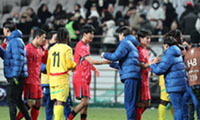▶ ROGER COHEN
He is a simple angular man, a dreamer, who as a young boy had engraved his initials on a retaining wall of rocks at the back of his family’s plot. When asked why, he replied, “Because one day people will know my name.”
On the farm, he works hard by day and reads voraciously by night. He is consumed with the long suffering of the Ukrainian peasant laboring in near feudal conditions. Neighboring countries have gained their independence and dignity after Soviet occupation. Why, he asks, should Ukraine not do the same?
To this teenager, the issue is simple. The imperial ruler in the Kremlin knows nothing of Ukraine. The 21st-century world is changing, but this high officer of the imperium is determined to wind back the clock to the 20th. A good student, the man travels to Kiev, where an older brother works. He falls into the “Young Ukraine” movement, a radical student circle in which feelings run high over the shotgun referendum that saw the people of Crimea vote with Orwellian unanimity for union with Russia. At night, he fingers the hand-engraved Browning pistol that was once his father’s.
A plot is hatched. The Russian defense minister is to visit Sevastopol with his wife to celebrate the wise choice of the Crimean people and speak of Russia’s civilizing influence over this beautiful but backward region. Fanfare follows. “Wide Is My Motherland” booms from loudspeakers as the minister’s procession of black limousines snakes along the waterfront. The assassin is waiting at a point where the minister and his wife are to greet local dignitaries.
Two shots ring out. One cuts through the minister’s jugular vein. The other penetrates his wife’s abdomen. The minister’s last words are spoken to her: “Don’t die, don’t die, live for our children.”
Events now move quickly. Russia annexes Crimea. It declares war on Ukraine, takes Donetsk in short order, and annexes the eastern half of the country. The United States warns Russia not to advance on Kiev. It reminds the Kremlin of America’s binding alliance with Baltic states that are NATO members. European nations mobilize.
Desperate diplomacy unravels. A Ukrainian counterattack flounders but inflicts heavy casualties, prompting a Russian advance on the capital. Two NATO F-16s are shot down during a reconnaissance flight close to the Lithuanian-Russian border. Russia declares war on Estonia, Latvia and Lithuania. Invoking Article 5 of the North Atlantic Treaty — an attack against one member shall be considered an attack against all — the United States and its European allies come to their defense. China, in what it calls a pre-emptive strike, invades Taiwan, “a potential Crimea.” Japan and India declare war on China. World War III has begun.
It could not happen. Of course, it could not happen. The institutions and alliances of a connected world ensure the worst cannot happen again. The price would be too high, no less than nuclear annihilation. Civilization is strong, humanity wise, safeguards secure.
Yes, the Great War, the end of empires and the old order, was triggered by a teenager. And, as Butcher writes, “It was out of this turbulent collapse that Bolshevism, socialism, fascism and other radical political currents took root.” They would lead to World War II.
Princip acted with a small group of accomplices bent on securing the freedom of the south Slavs from the Austro-Hungarian Empire. Luck helped him, diplomatic ineptitude force-multiplied his deed, and by the age of 23 this farmboy whose name would be remembered was dead of tuberculosis in a Habsburg military prison.
Then, too, exactly a century ago, it could not happen. The world had finessed other moments of tension. Yet very quickly Austria-Hungary had declared war on Serbia, prompting Russia to mobilize in defense of Belgrade, prompting the Kaiser’s Germany to attack France pre-emptively and Britain to declare war on Germany. The war haunts us still.
The unthinkable is thinkable. Indeed, it must be thought. Otherwise it may occur — soldiers reduced, in Butcher’s words, to “fodder locked in the same murderous morass, sharing the same attrition of bullet and barrage, disease and deprivation, torment and terror.”
스마터리빙
more [ 건강]
[ 건강]이제 혈관 건강도 챙기자!
[현대해운]우리 눈에 보이지 않기 때문에 혈관 건강을 챙기는 것은 결코 쉽지 않은데요. 여러분은 혈관 건강을 유지하기 위해 어떤 노력을 하시나요?
 [ 건강]
[ 건강]내 몸이 건강해지는 과일궁합
 [ 라이프]
[ 라이프]벌레야 물럿거라! 천연 해충제 만들기
 [ 건강]
[ 건강]혈압 낮추는데 좋은 식품
[현대해운]혈관 건강은 주로 노화가 진행되면서 지켜야 할 문제라고 인식되어 왔습니다. 최근 생활 패턴과 식생활의 변화로 혈관의 노화 진행이 빨라지고
사람·사람들
more
“이민 선구자들에 바치는 헌사”
이진영 감독은 이화여대 언론정보학/영상학과를 졸업하고 하와이로 이민왔다. 하와이 한국일보 기자, KBFD-TV 앵커 등으로 10년간 일하고 2…

김영화 수필가 ‘한국디지털문학상’ 대상
본보 화요칼럼 필진으로 활동하고 있는 수필가 김영화씨가 한국디지털문인협회(회장 김종회)가 주최하는 제4회 한국디지털문학상 공모에서 로 대상을 …
화랑청소년재단 차세대 정체성 리더십 포럼 성료
화랑청소년재단(회장 샘 신)과 화랑인터내셔널(총재 박윤숙)이 주최·주관한 제21회 차세대 정체성 리더십 포럼이 지난 15일 LA 시청에서 20…
제1회 ‘도전! 한국역사퀴즈대회’ 성료
미주한국학교총연합회(회장 이영숙)가 주최한 ‘제1회 도전! 한국역사퀴즈대회’가 지난 15일 부에나파크 하나교회에서 성황리에 열렸다. 선착순 모…
박정희 기념사업회 탄신 108주년 기념행사
미주박정희대통령기념사업회(회장 이재권)는 지난 14일 아로마 센터에서 박 대통령 탄신 108주년 기념 만찬을 개최하고 기념 촬영을 진행했다. …
많이 본 기사
- 380만 건 적체에 멈춘 이민법원… 한인들 ‘신분 위기’
- 김우빈♥신민아, 10년 열애 끝에 결혼
- 탁재훈, 아들 얼굴 공개..美 명문대 재학·남다른 피지컬 자랑
- 악뮤 수현, 다이어트로 얼마나 뺀 거야..반쪽된 근황
- ‘처가 손절’ 이승기, 부모에 ‘억’ 소리 나는 ‘효도’.. “26억대 타운하우스 증여”
- 구혜선, 벤처기업 대표 변신..특허 취득한 헤어롤 론칭 “완판 기대”
- 267명 탄 여객선 좌초… 9시간만에 전원 구조
- 교황 “극도로 멸시적인 대우” 트럼프 이민정책 거듭 비판
- ‘엡스타인 파일 공개 법안’ 가결
- 공화당 선거구 조정안, 텍사스 연방법원서 제동
- 토랜스 제일장로교회 EM 목사, 부당해고 소송
- 내년 선거 민주당 ‘압도’… 공화당 ‘경고등’
- [쿠쿠] 연중 한번 ‘블랙프라이데이’ 메가세일
- 50년 상환 모기지?… 전문가들 “득보다 실이 크다”
- 친구들과 걷는데 나만 뒤처진다면… “폐 기능 검사 받아보세요”
- 가주 주지사 경선구도 ‘안갯속’
- “임금 미지급 시 최대 3배 벌금… 주 고용법 강화”
- 의회가 공개 결정 ‘엡스타인 파일’… 정·재계 ‘뇌관’되나
- 정부, 셧다운 이후 첫 경제지표 발표
- [전문가 칼럼] 나이를 잊게 하는 뇌 건강법
- [경제 트렌드] 부유층이 원하는 건 ‘프라이빗 럭서리’
- 트럼프, 채권 집중 매입 8월 이후 최대 4억달러
- 월세 대신 자산 만드는 방법
- LA 한국문화원, 스미소니언 ‘이건희 컬렉션’ 설명회 개최
- 고령층 노린 보이스피싱 자금세탁
- “정기적인 음악 감상… 치매 위험 감소와 관련”
- 구글 ‘제미나이3’ 출시 검색창에도 전진 배치
- [수잔 최 변호사의 LIFE &] 서울 가을 자락에서 만난 쉼터
- 재융자 기회 돌아왔나?… 이자율 인하에 재융자 관심↑
- 한인 커뮤니티의 중심지 ‘부에나팍’
- 올해 스키 시즌 시작 맘모스는 오늘 개장
- “내연기관부터 자율주행… LA 오토쇼 경험하세요”
- 홍명보호 올해 일정 끝… 중원조합·수비불안 ‘해결 과제’
- 화랑청소년재단 차세대 정체성 리더십 포럼 성료
- 25일 추수감사절 노인잔치 파바월드·시니어센터 주최
- 스리마일섬 원전 재가동 미 정부, 10억달러 대출
- [지평선] 타이레놀과 아세트아미노펜
- 뒤늦게 시작된 ‘킹’ 제임스의 23번째 시즌… 더블더블 활약
- 50년 만기 모기지?… 트럼프 추진 정책 주택시장 해법 될까
- [기고] 디지털 주권의 토대, 소버린 클라우드
- [백상논단] 젠지혁명와 유스 액티비즘
- 박정희 기념사업회 탄신 108주년 기념행사
- LA 한인상의, LA 지자체들과 간담회 개최
- 루카스 미술관 내년 9월 오픈
- ‘일본 7승-한국 6승-미국 3승’
- 인플레이션 시대와 부동산 이야기
- [윌셔에서] 틈과 행간 사이를 서성이며
- [왈가 왈부] ‘한미협상 국회 비준’ 갑론을박… 외교는 ‘국익’이 먼저죠
- 로보택시 경쟁 가열… 아마존 죽스 가세
- 이자율 옮길 수 있는 융자와 50년 대출
1/5지식톡

-
 테슬라 자동차 시트커버 장착
0
테슬라 자동차 시트커버 장착
0테슬라 시트커버, 사놓고 아직 못 씌우셨죠?장착이 생각보다 쉽지 않습니다.20년 경력 전문가에게 맡기세요 — 깔끔하고 딱 맞게 장착해드립니다!장착비용:앞좌석: $40뒷좌석: $60앞·뒷좌석 …
-
 식당용 부탄가스
0
식당용 부탄가스
0식당용 부탄가스 홀세일 합니다 로스앤젤레스 다운타운 픽업 가능 안녕 하세요?강아지 & 고양이 모든 애완동물 / 반려동물 식품 & 모든 애완동물/반려동물 관련 제품들 전문적으로 홀세일/취급하는 회사 입니다 100% …
-
 ACSL 국제 컴퓨터 과학 대회, …
0
ACSL 국제 컴퓨터 과학 대회, …
0웹사이트 : www.eduspot.co.kr 카카오톡 상담하기 : https://pf.kakao.com/_BEQWxb블로그 : https://blog.naver.com/eduspotmain안녕하세요, 에듀스팟입니다…
-
 바디프렌드 안마의자 창고 리퍼브 세…
0
바디프렌드 안마의자 창고 리퍼브 세…
0거의 새제품급 리퍼브 안마의자 대방출 한다고 합니다!8월 23일(토)…24일(일) 단 이틀!특가 판매가Famille: $500 ~ $1,000Falcon: $1,500 ~ $2,500픽업 & 배송직접 픽업 가능LA…
-
 바디프렌드 안마의자 창고 리퍼브 세…
0
바디프렌드 안마의자 창고 리퍼브 세…
0거의 새제품급 리퍼브 안마의자 대방출 한다고 합니다!8월 23일(토)…24일(일) 단 이틀!특가 판매가Famille: $500 ~ $1,000Falcon: $1,500 ~ $2,500픽업 & 배송직접 픽업 가능LA…
케이타운 1번가
오피니언
 수잔 최 한미가정상담소 이사장 가정법 전문 변호사
수잔 최 한미가정상담소 이사장 가정법 전문 변호사 [수잔 최 변호사의 LIFE &] 서울 가을 자락에서 만난 쉼터
 강민수 을지대 첨단학부 교수 한국인공지능학회장
강민수 을지대 첨단학부 교수 한국인공지능학회장 [기고] 디지털 주권의 토대, 소버린 클라우드
 이숙종 성균관대 국정전문대학원 특임교수
이숙종 성균관대 국정전문대학원 특임교수 [백상논단] 젠지혁명와 유스 액티비즘
 박연실 수필가
박연실 수필가 [윌셔에서] 틈과 행간 사이를 서성이며
 이동현 / 한국일보 논설위원
이동현 / 한국일보 논설위원[지평선] 타이레놀과 아세트아미노펜

[왈가 왈부] ‘한미협상 국회 비준’ 갑론을박… 외교는 ‘국익’이 먼저죠
 정숙희 논설위원
정숙희 논설위원사라진 백악관의 이스트 윙
 파리드 자카리아 워싱턴포스트 칼럼니스트 / CNN ‘GPS’ 호스트
파리드 자카리아 워싱턴포스트 칼럼니스트 / CNN ‘GPS’ 호스트 계속되는 민주당의 헛손질
 김동찬 시민참여센터 대표
김동찬 시민참여센터 대표 [미국은 지금] 미국 정치의 파산과 그 댓가
1/3지사별 뉴스

22기 뉴욕평통 출범식⋯“힘찬 출발”
22기 민주평화통일자문회의 뉴욕협의회(회장 이시화)는 17일 퀸즈 플러싱 소재 코리아빌리지 디모스 연회장에서 자문위원 173명을 비롯한 한인사…
메디케이드 받으면 영주권 신청 거부된다

VA 주지사 인수인계 ‘삐걱’…UVA 총장 선임 ‘격돌’
버지니아 글렌 영킨(Glenn Youngkin, 공화, 사진 왼쪽) 주지사와 내년 1월 취임하는 아비가일 스팬버거(Abigail Spanber…
북VA 불법 마사지업소 260곳 넘는다

오프라인 한국어 과정 성공적 마무리 단계
샌프란시스코 한국 교육원(허혜정 원장)이 2025년 가을 학기에 처음 개설한 오프라인 한국어 과정 ‘한국어 1’이 오는 22일 성공적인 마무리…
마라나타 비전교회, 장로/안수집사 임직및 장로 은퇴예배

오늘 하루 이 창 열지 않음 닫기 


















































.png)


댓글 안에 당신의 성숙함도 담아 주세요.
'오늘의 한마디'는 기사에 대하여 자신의 생각을 말하고 남의 생각을 들으며 서로 다양한 의견을 나누는 공간입니다. 그러나 간혹 불건전한 내용을 올리시는 분들이 계셔서 건전한 인터넷문화 정착을 위해 아래와 같은 운영원칙을 적용합니다.
자체 모니터링을 통해 아래에 해당하는 내용이 포함된 댓글이 발견되면 예고없이 삭제 조치를 하겠습니다.
불건전한 댓글을 올리거나, 이름에 비속어 및 상대방의 불쾌감을 주는 단어를 사용, 유명인 또는 특정 일반인을 사칭하는 경우 이용에 대한 차단 제재를 받을 수 있습니다. 차단될 경우, 일주일간 댓글을 달수 없게 됩니다.
명예훼손, 개인정보 유출, 욕설 등 법률에 위반되는 댓글은 관계 법령에 의거 민형사상 처벌을 받을 수 있으니 이용에 주의를 부탁드립니다.
Close
x